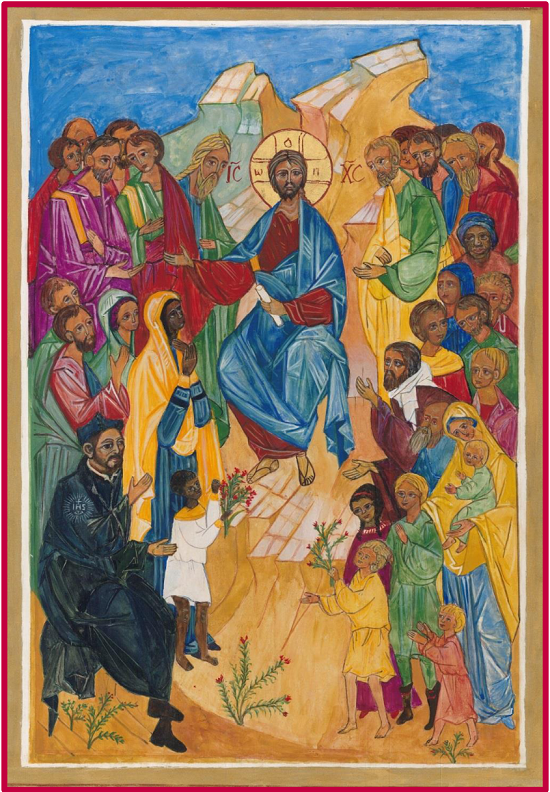Come Away
Sixteenth Sunday Scripture Readings

This morning’s gospel passage from Saint Mark is in a somewhat unusual position for two reasons. First, it forms a link between the mission of the Twelve that we heard about last week, and the multiplication of the loaves, which will come next Sunday. Also, next Sunday, Mark’s gospel, which we’ve been following since Pentecost, will be interrupted, and Mark’s narration of the multiplication of the loaves will be replaced by that from Saint John. John’s meditation on the Bread of Life, which begins next week and continues throughout all of August, is nothing less than his presentation of the institution of the Eucharist and its meaning. That’s the context—between mission and eucharist—in which we find ourselves this morning.
Mark tells us that the Twelve have returned from their mission. As a sidelight, we might suggest that the description Mark gives us about it was most probably composed after the Resurrection because the Twelve are nowhere else in this gospel called “apostles,” and their mission before Pentecost was not to teach, but to preach repentance. All that aside, the Twelve did return from their business trip, and, as we might expect, they held a debriefing session. We can imagine Jesus sitting them down and asking, “How’d it go? What went well? What could you have done better?” The other gospels tell us that the Twelve were very excited to report their successes.
We ought to pay attention to what Jesus says to them next: “Come away by yourselves to a deserted place and rest a while.” The first thing we might notice here is Jesus’s concern for the disciples he sent out to carry on his work. He didn’t insist that they just turn around and get on with the next item on the agenda. He offered them a respite from their labors. He insisted on self-care. He took them on retreat. When we encounter this passage, it should give us pause to ask ourselves, “When was the last time I went off to a deserted place to rest?” Taking Jesus’s advice to the Twelve to heart will go a long way toward keeping us grounded as human beings, rather than human doings.
Like many of us, Jesus’s work followed him on his vacation. How could he—how could the Twelve—escape so many needy people? When Jesus and the Twelve arrived at the deserted place, it was anything but deserted. Yet, he didn’t run away and hide. “His heart was moved with pity for them …” His was a heart committed to the well-being of others: first, the Twelve, and now the crowds. They were hungry, but not so much for food … although that would come later. They were hungry for answers. Like us, they asked, “Why did God allow this to happen to me? … to us?” Jesus fed the people with his teachings to satisfy their hungry hearts and offer them the peace that comes from experiencing the love of God first-hand. He gave of himself.
He thought of them as sheep—not stupid animals but lost and confused—and he volunteered to be their shepherd and lead them into safety, not only as individuals but as a sheepfold. By doing this, he reflected the love of the Father to whom the nation had always looked as the Shepherd of Israel, as we hear in Psalm 80:
“Shepherd of Israel, hear us
you who guide Joseph like a flock!
… Stir up your power and come to save us.
O God restore us;
Show us your face and we shall be saved.” [Psalm 80:2,4]
The whole point of the image of the shepherd is that he cares. He cares that his people are physically, emotionally, and spiritually exhausted. He cares that they’re hungry for more than food. They hunger for meaning; they hunger for direction. They hunger for healing; they hunger for peace—not just an absence of conflict, but a peace that this world cannot give. They hunger for a still point in a world that’s spinning out of control. The Good Shepherd offers us the greatest of all gifts: the assurance that Almighty God is crazy in love with each one of us and would never let his beloved perish. It’s a love stronger than death itself. And it’s the knowledge of that love that drives out all our fears.
God loves us enough to die for us … and he proved it. What are we then worried about? We’ve been freed from all that self-concern so that we can show others the lovingkindness that we’ve been shown. To bring God’s love to others is our mission and our purpose. That’s what gives us meaning and direction. That’s what gives us healing and peace. That’s what makes of us that still point in this crazy world that we’ve all been seeking. That’s what makes us eucharist: a living, loving sacrifice of thanksgiving and praise.
Get articles from H. Les Brown delivered to your email inbox.
